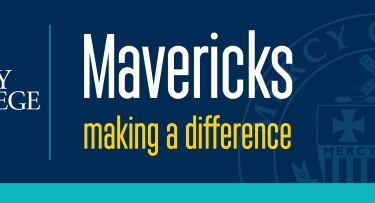Mavericks Making a Difference: Not all Health Care Heroes Wear PPE: Data Analyst Ashley Scott, M.B.A. ’17 Enhances COVID-19 Health Outcomes

While stories of brave nurses and doctors on front lines of the coronavirus (COVID-19) situation have rightly dominated news headlines for the past three months, there has been less coverage of the individuals sitting behind computer screens, crunching numbers to study disease patterns and recommend best treatment practices to enhance COVID-19 health outcomes.
Ashley Scott, M.B.A. ’17 is one of these heroes behind the scenes. As data analyst for Albert Einstein College of Medicine, Scott helps ensure future health care providers, including medical students, are afforded high-quality education so that they are more prepared to address future crises as doctors in the workforce.
In terms of her day-to-day responsibilities, Scott deciphers the feedback medical students give concerning their faculty, coursework and clinical rotations, and prepares data reports based on their satisfaction ratings. If there is room for improvement, Albert Einstein College of Medicine will adjust curricula and clinical rotation procedures based on Scott and her team’s data evaluations and subsequent proposals. Scott’s work is especially critical during the COVID-19 pandemic as she analyzes data related to the experiences of students and doctors on the ground.
“I understand that appropriate data collection is vital to issuing effective, safe outcomes and keeping communities and populations safe. I think this situation poses an opportunity for big data analytics to possibly help control and give insight to tracking coronavirus across the globe,” Scott said.
While she is not physically in hospital rooms with COVID-19 patients, she collects and analyzes the comments and feelings of doctors and medical students daily. “With the data I collect, almost in real time, and the recommendations we give, medical students and doctors can adapt their treatment plans to provide the best care possible in an ever-changing COVID-19 environment,” Scott described.
“We get such valuable feedback from providers on the front lines of the pandemic on what works and what doesn’t work. As a data collector, I’m also a data ‘storyteller’ – I’ll be able to tell future generations of medical professionals what to do in a health pandemic.”
Albert Einstein College of Medicine is a medical school in the Morris Park neighborhood of the Bronx in New York City and operates under the Montefiore Medical Center. The College is home to a highly diverse student body that serves an equally diverse community and according to Scott, “…provides a gateway for these communities to receive blue ribbon medical education and care.” Scott is grateful to Mercy for preparing her to work at an acclaimed medical school, teaching her the skill sets necessary to excel as a data analyst and navigate this challenging time. “At Mercy College I learned how to make statistical inferences, model predictions, and manage data sets in and outside of the classroom,” she said. “Also, when interviewing for a job after graduation, I showcased my expertise in relevant software and my participation in global experiential programs offered by Mercy.”
She also explained: “Mercy alumni relations has offered supportive virtual events and emails. Staying connected and informed assured me that my Mercy College family was well equipped to traverse the challenges associated with the pandemic – I felt like Mercy had things under control and had my back.”
Mercy is a strong community and by working together we will make our community even stronger. If you are a Maverick making a difference, or you know of one, let us know at PR@mercy.edu.
Donate here to support Mercy students.

